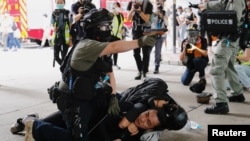Hong Kong police made their first arrests Wednesday under a new national security law imposed by China’s central government.
A man and a woman holding Hong Kong independence signs were arrested in two separate incidents hours after the new law took effect.
And at least 70 people who were part of a large protest group that had gathered in Hong Kong’s Causeway Bay were arrested after riot police fired water cannon and pepper spray to break up the crowd. Police said the participants were charged with unlawful assembly to violation of the new national security law.
The law took effect on the 23rd anniversary of Britain’s handover of Hong Kong to Beijing. City authorities had banned the annual rally marking the anniversary of the handover, citing risks of the coronavirus pandemic.
The new law, approved Tuesday in Beijing by the Standing Committee of China’s National People’s Congress and signed into law by President Xi Jinping, calls for the central government to establish a national security office in Hong Kong aimed at confronting subversion of state power, terrorism, separatism and collusion with foreign forces.
Anyone convicted under the law could face anywhere from a few years to life in prison, and could be extradited to mainland China to stand trial.
Hong Kong chief executive Carrie Lam said the law’s enactment was the most important development for the financial hub at a ceremony marking the anniversary.
Pro-democracy activists in Hong Kong, as well as the United States and other Western nations, say the law undermines the “one country, two systems” concept that was part of the 1997 handover deal, which guaranteed the city a high degree of autonomy and civil liberties for 50 years.
The new law caps President Xi’s aggressive efforts to tighten control over the financial hub over the past few years, which has led to massive street protests by pro-democracy activists seeking greater freedoms for Hong Kong. The city was rocked during the second half of 2019 by angry and often violent demonstrations sparked by a controversial extradition bill that was eventually withdrawn.
The action by the Chinese legislature bypasses Hong Kong’s legislature, which has the authority to pass any security laws under the Basic Law, the city’s constitution. Hong Kong lawmakers have been pressured by Beijing in the past to approve a national security law, but were met by heavy protests.






